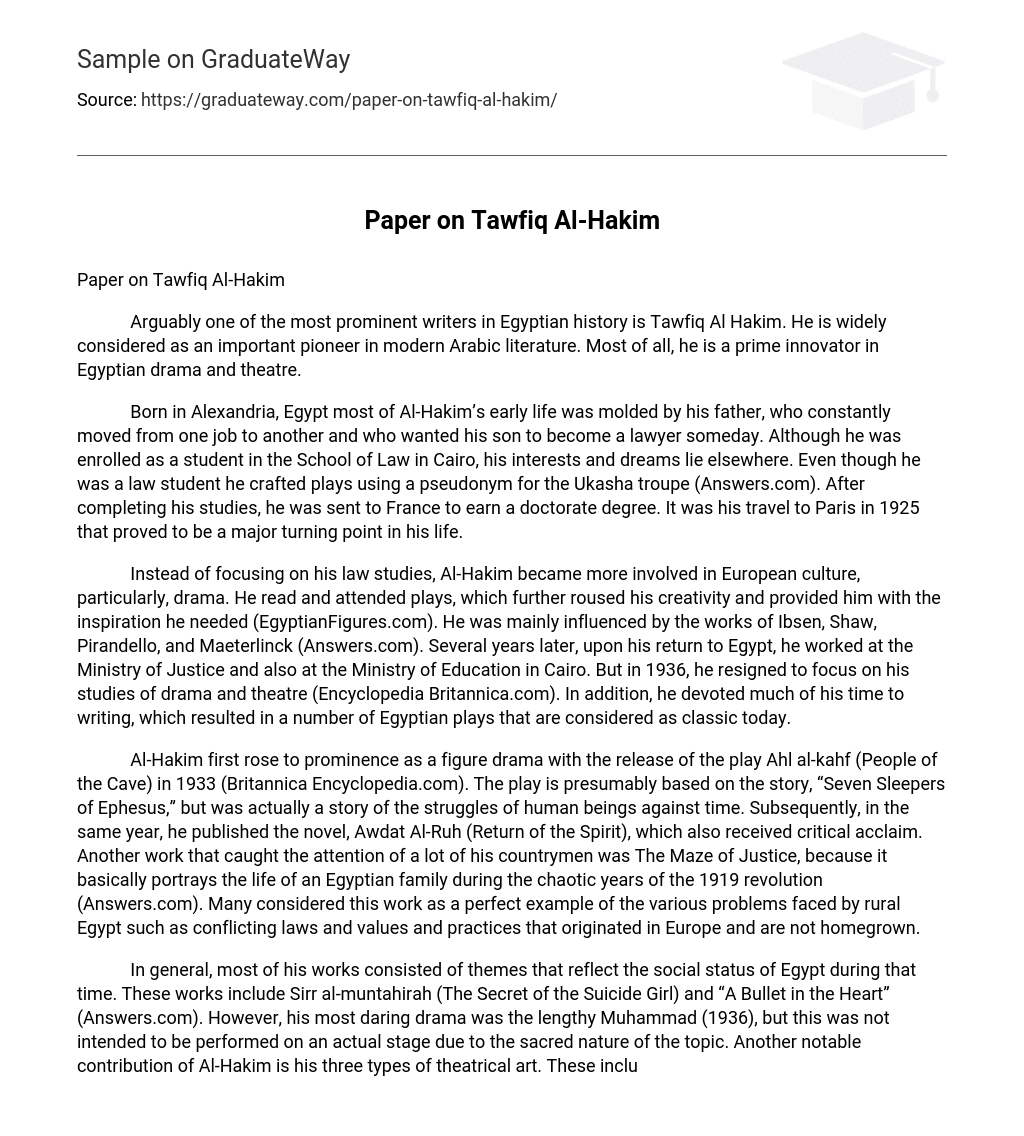Arguably one of the most prominent writers in Egyptian history is Tawfiq Al Hakim. He is widely considered as an important pioneer in modern Arabic literature. Most of all, he is a prime innovator in Egyptian drama and theatre.
Born in Alexandria, Egypt most of Al-Hakim’s early life was molded by his father, who constantly moved from one job to another and who wanted his son to become a lawyer someday. Although he was enrolled as a student in the School of Law in Cairo, his interests and dreams lie elsewhere. Even though he was a law student he crafted plays using a pseudonym for the Ukasha troupe (Answers.com). After completing his studies, he was sent to France to earn a doctorate degree. It was his travel to Paris in 1925 that proved to be a major turning point in his life.
Instead of focusing on his law studies, Al-Hakim became more involved in European culture, particularly, drama. He read and attended plays, which further roused his creativity and provided him with the inspiration he needed (EgyptianFigures.com). He was mainly influenced by the works of Ibsen, Shaw, Pirandello, and Maeterlinck (Answers.com). Several years later, upon his return to Egypt, he worked at the Ministry of Justice and also at the Ministry of Education in Cairo. But in 1936, he resigned to focus on his studies of drama and theatre (Encyclopedia Britannica.com). In addition, he devoted much of his time to writing, which resulted in a number of Egyptian plays that are considered as classic today.
Al-Hakim first rose to prominence as a figure drama with the release of the play Ahl al-kahf (People of the Cave) in 1933 (Britannica Encyclopedia.com). The play is presumably based on the story, “Seven Sleepers of Ephesus,” but was actually a story of the struggles of human beings against time. Subsequently, in the same year, he published the novel, Awdat Al-Ruh (Return of the Spirit), which also received critical acclaim. Another work that caught the attention of a lot of his countrymen was The Maze of Justice, because it basically portrays the life of an Egyptian family during the chaotic years of the 1919 revolution (Answers.com). Many considered this work as a perfect example of the various problems faced by rural Egypt such as conflicting laws and values and practices that originated in Europe and are not homegrown.
In general, most of his works consisted of themes that reflect the social status of Egypt during that time. These works include Sirr al-muntahirah (The Secret of the Suicide Girl) and “A Bullet in the Heart” (Answers.com). However, his most daring drama was the lengthy Muhammad (1936), but this was not intended to be performed on an actual stage due to the sacred nature of the topic. Another notable contribution of Al-Hakim is his three types of theatrical art. These include Biographical theatre, Intellectual theatre, and Objective theatre (EgyptianFigures.com). In Biographical theatre, he illustrated his personal experiences and perceptions towards various issues and topics in life while in Intellectual theatre, the plays were only meant to be read and not acted, which is why he never labeled them as true plays. On the other hand, in Objective theatre, the plays he wrote were solely meant to portray the realities of Egyptian life (EgyptianFigures.com). He died in 1987.
In short, Al-Hakim introduced major ideas in drama and arguably revolutionized Arabic literature itself. He also single-handedly made drama an integral and highly-acclaimed part of Arabic literature. Prior to his contributions, prose plays were mainly comedies or farces while poems were more used in the depicting heroic drama. It can be surmised that without him, Arabic drama wouldn’t have gained the prominence that it has today.
Works Cited
“Tawfiq Al-Hakim.” 2009. Answers.com. 6 May 2009 <http://www.answers.com/topic/tawfiq-al-hakim>.
“Tawfiq Al-Hakim.” Encyclopedia Britannica. 2009. Encyclopedia Britannica Online. 6 May 2009 <http://www.britannica.com/EBchecked/topic/252131/Tawfiq-Husayn-al-Hakim>.
“Tawfiq Al-Hakim 1903-.” 2009. Egyptian Figures.com 6 May 2009 <http://www.sis.gov.eg/VR/figures/english/html/Hakim.htm>.





